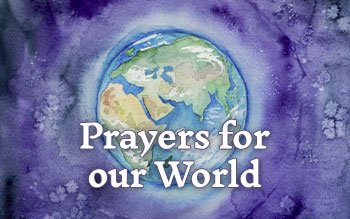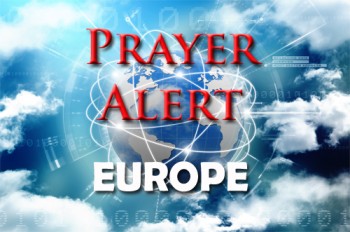Displaying items by tag: christianity
Christian beliefs on a par with racist views?
Christian doctor David Mackereth, with over 26 years of experience, found that for upholding Biblical truth you can lose your job. A judge has ruled that his belief in Genesis 1:27 is ‘incompatible with human dignity’. The judge is saying that there is no protection in law for the Biblical belief that God made humans unchangeably male and female, putting Christian truth in the same category as racist and Neo-Nazi views. David held to what God says about men and women and his Christian views were not protected in a UK court of law. He lost his job for telling the truth, and now an Employment Tribunal has ruled against him. Christian Concern’s expert legal team has already started work to take this case to an appeal tribunal.
Africa: false prophets
Ever since the missionary era, Christianity has had a positive impact on Africa. In addition to evangelism and discipleship, Christian communities were behind the founding and growth of educational institutions, health facilities, poverty alleviation projects, children’s homes, and even civic initiatives. As a result, Christianity not only continues to grow, but has also achieved significant acceptance as a force for social good. Now, however, false prophets are chipping away at its moral credibility and public strength. Among these self-proclaimed ‘servants of God’, the values that have traditionally distinguished Christian ministry are increasingly absent. Humility, compassion, selfless service, and servant leadership are replaced by a preoccupation with image consciousness, self-aggrandisement, and enlargement of personal influence. This is in sad contrast to the faithful pastoral care and preaching of countless African Christians who are not motivated by self-promotion and gain. For truths supporting the above, click the ‘More’ button.
Benin: prayer needs
Benin is best known for its peaceful democracy, one of the most stable in Africa. However, corruption remains a significant issue. The country, once hosting main ports crucial in the slave trade, still negotiates shady deals. Poverty increases each year. This year deadly protests broke out after opposition parties were banned from participating in elections. The nation’s annual Voodoo Day brings thousands of participants to the country’s celebration. Voodoo, a religion approved by the government, has more than 60% devotees and contributes to significant spiritual bondages over the nation, its people and the Church. The country allows freedom to practise and propagate any religion. Pray for humility and repentance to grip the government (2 Chronicles 34:27). Because Benin has such strong connections with voodoo, it is difficult for people involved to leave it and follow Jesus. It is also difficult for Christians to grow in their faith without dealing with the spiritual bondages of voodoo. Ask God to minister deliverance and freedom (2 Corinthians 2:11).
The Staggering Rise of the Church in Iran
Robert Bruce, a Scottish missionary to Iranian Muslims in the late nineteenth century, wrote home to his supporters, “I am not reaping the harvest; I scarcely claim to be sowing the seed; I am hardly ploughing the soil; but I am gathering out the stones. That, too, is missionary work; let it be supported by loving sympathy and fervent prayer.”
For many years, Iran was one of the most difficult regions of the world to reach with the gospel. A significant development occurred in 1979, however, with the Islamic Revolution in Iran. The ruling monarch, Shah Mohammed Reza Pahlavi, was overthrown, and in his place an Islamic Republic was birthed, led by the Ayatollah Khomeini. Sharia law became the law of the land, and Muslim clerics became the heads of state.
Many in those days believed the revolution would lead to a time of flourishing in Iranian society. The new regime made great promises about rights and economic progress, as Iran was finally free from the influence of the West. The laws of man would be replaced by the laws of God, they claimed. Under the Republic, conversion to any other religion was considered apostasy and could be punished with death.
Door Opens
As we near the fortieth anniversary of the Islamic Revolution, however, we see that the prayers of many Christians over the years have been answered, and the climate in Iran is vastly different. The gospel has spread throughout the land in unprecedented fashion despite increased persecution of Christian believers. To use the words of the apostle Paul, “A wide door for effective work has opened . . . and there are many adversaries” (1 Corinthians 16:9).
As of 1979, there were about five hundred known Christians from a Muslim background in Iran. In 2005, it was estimated that there were 40,000 ethnic Iranian Christians (not including ethnic minority Christians who live in Iran). That number grew to about 175,000 Christians in 2010, according to the Joshua Project. Today, the average estimates of Christians within Iran range from 300,000 to upwards of one million, according to some missions experts. Operation World, a missions research organization, continues to list Iran as having the fastest-growing evangelical church in the world. In fact, more Iranians have become Christians in the last twenty years than in the previous 1,300 years, since Islam came to Iran.
Four Reasons for Growth
Several factors have contributed to the rapid growth of the church in Iran. Here are four of the most important.
1. Disillusionment with Islam
Since the time of the revolution, the Islamic regime, which promised much in the way of economic development and freedom, has not delivered. Rather than prosperity and growth, the economy stagnated. The people also have been oppressed — women punished for not covering their hair, and others punished for speaking out freely in protest. As a result, the country has isolated itself further from the rest of the world.
Ironically, because the Islamic Republic in Iran has tied religion and state so closely together, the people’s disappointment with the government has led to great skepticism of Islam. Consequently, Iranians have become increasingly open to hearing the Christian message.
2. Persecution
The rise of persecution against Christians in Iran has served both as a sign of the rapid growth of Christianity within the country and as fuel for further growth. In the 1990s, several key leaders of the church in Iran were killed. One of the most famous martyrs, Mehdi Dibaj, gave a defense before the Islamic courts prior to his death that has become a rallying cry for many Christians in Iran. Dibaj declared,
I would rather have the whole world against me, but know that the Almighty God is with me; be called an apostate, but know that I have the approval of the God of glory. . . .
Life for me is an opportunity to serve him, and death is a better opportunity to be with Christ. Therefore I am not only satisfied to be in prison for the honor of his Holy Name, but am ready to give my life for the sake of Jesus my Lord and enter his kingdom sooner, the place where the elect of God enter to everlasting life.
Examples like this have emboldened the church as the faithful remember the words of Jesus, “Because you are not of the world, but I chose you out of the world, therefore the world hates you” (John 15:19). In 2010, many church planters and leaders were arrested. I had the privilege of visiting with one of these faithful brothers after he served five years in prison. He recounted the moment when he received news that many of his colleagues were being arrested.
Briefly, he considered fleeing. But then he remembered the words of Jesus from John 10, that he is not the hired hand who sees the wolves coming and flees, but he is rather the good shepherd, who lays his life down for his sheep (John 10:11–12). He told me he went home knowing it would lead to his arrest, but he saw prison as an assignment by God to be a ministry post for him to reach many within prison.
This persecution has served to motivate further evangelistic zeal among Iranian Christians. These faithful servants are modern-day examples of Paul, who once wrote, “Most of the brothers, having become confident in the Lord by my imprisonment, are much more bold to speak the word without fear” (Philippians 1:14).
3. The Diaspora and Use of Media
A countless number of Iranian Christians have been scattered around the world. Many of these saints sense a unique calling to continue supporting the work of gospel advancement within Iran from the outside.
The advancement of technology through the Internet and satellite TV has made the Christian message more accessible to Iranians who may have never even met a Christian. The diaspora Christians have been active in broadcasting the gospel and Bible teaching into Iran. In the last decade, social media also has been a powerful tool to reach Iranians and teach them the truths of Scripture.
4. Bible Distribution
Although persecution has not produced the results that the Iranian authorities wanted, they have continued to work hard to stamp out the message of Christianity. The Bible (especially the New Testament) is banned literature in Iran.
But the people have been hungry for the word of God. There have been over two million New Testaments printed in recent years for dissemination in Iran, and about 180,000 entire Bibles have been distributed within the country. As Paul told Timothy, “The word of God is not bound!” (2 Timothy 2:9).
Three Ways to Pray
These are some factors that have contributed to the rapid growth of the church in Iran. But ultimately, the kingdom of Christ is spreading within Iran because God’s Spirit is moving powerfully. Though there has been great progress, the need for prayer and support continues to be great. Would you join me in praying for Iran — its people and leaders? Here are three ways you can pray for the church.
1. Courage
Although the number of house churches and believers is growing every day, the opposition continues. Iranian Christians continue to be arrested and charged with acting against national security. House churches continue to meet secretly while shifting their meeting times and locations to stay undetected. Christians continue to evangelize, knowing they are putting their lives at risk.
2. Unity
Since most of the activity of the church is done secretly, the Christians are isolated from each other. Iranian leaders are forced to work covertly and therefore apart from each other. Security concerns make collaborative efforts difficult, even among ministries outside of Iran that work within the country. All of this creates obstacles for unity.
3. Trained Leaders
The nature of the underground church is such that, many times, house-church leaders are unqualified and untrained, and sometimes, there is no pastor in the group and the gathered believers are being fed solely through satellite TV. Some of the teaching that the church absorbs is not sound theology. Iranians don’t have the same access to Christian literature and training as many believers do throughout the rest of the world. There are ministries who are already working hard to meet this need by making quality training available for leaders, and we need to pray for this work.
These words of Jesus may sum up the situation best in Iran: “The harvest is plentiful, but the laborers are few; therefore pray earnestly to the Lord of the harvest to send out laborers into his harvest” (Matthew 9:37–38). Let’s pray the Lord of the harvest continues to send his laborers throughout Iran, so that millions more Iranians find forgiveness, peace, and the hope of glory through the gospel of Jesus Christ.
Article by Afshin Ziafat, Pastor, Frisco, Texas - (@afshinziafat) is lead pastor of Providence Church in Frisco, Texas. His passion is to teach the word of God as the authority and guide for life, to preach Jesus Christ as the only Savior and Redeemer of mankind, and to proclaim the love of Christ as the greatest treasure and hope in life. He and his wife, Meredith, currently reside in Frisco with their three children.
State of Europe Forum
The recent Dutch provincial elections revealed a disturbing degree of provincialism and xenophobia; the leader of the winning party had dedicated his university dissertation to the French extreme nationalist Jean-Marie Le Pen! The upcoming State of Europe Forum in Bucharest will bring together Pentecostal, Evangelical, Protestant, Catholic and Orthodox clergy and lay people from across Europe to explore commonalities and differences in perspectives on the future of Europe. If we all accept that the Jesus story is the defining story of Europe, how do we bring his Lordship (see Ephesians 2: 4,5) to bear on our current challenges of populism, terrorism, corruption, cyberwarfare, nationalism, trafficking, migration, weakened democracy, xenophobia, and much more? God’s people of hope need to point in a different direction. We need to recover the story of Jesus as having ‘broken down every wall’ between race, gender and status, as the defining story of Europe.
Algeria: opportunities for Christianity
The 41 million people of this Muslim-majority country depend on fossil fuels for their export income. Recently finances have been hurt by the drop in oil prices, prompting cuts in state subsidies. Algeria struggles to provide jobs and homes for its people. Democracy and human rights exist on paper, less so in reality. In the midst of this, people are coming to Christ. Most new believers are from non-Arab backgrounds, but faith is also growing among Arabs and other people groups. New fellowships begin as believers move into Arab areas to share the gospel. Persecution is a fact of life. One Christian woman wrote, ‘Women converts to Christ face challenges which sometimes cost them dearly - rejected by their families, repudiated by their husbands, deprived of their children.’
Christianity as default gone
Europe’s march towards a post-Christian society has been starkly illustrated by research showing that a majority of young people in a dozen countries are not following any religion. A survey of 16- to 29 year-olds found that in the UK only 7% identify as Anglican and 10% as Catholic. Young Muslims, at 6% and rising, are on the brink of overtaking those who consider themselves part of the country’s established church. The UK figures were partly explained by high immigration - one in five Catholics in the UK was not born in the UK, neither were most of the Muslims. The figures were in a report, Europe’s Young Adults and Religion, by a professor of theology who said, ‘The new default setting for faith in the UK is no religion, and the few who are Christians see themselves as swimming against the tide.’
Christianity - Europe's 'last hope'
Hungary's prime minister Viktor Orbán has called Christianity the ‘last hope’ for Europe, as the continent struggles to integrate millions of Muslim migrants who have fled their countries of origin. Orbán also accuses some Western European governments of facilitating the ‘decline of Christian culture’, and paving the way for Islam's advance. In his annual state of the nation speech he warned these nations that they will be overwhelmed with Muslim migrants and their culture will drastically change for the worse. He said that if millions of young Muslims move north, large European cities will have a Muslim majority. The prime minister is expected to win a third term when Hungarians go to the polls in April. Pray for an end to the fear of declining Christian culture, and for Muslim refugees to have divine appointments with Christians in European cities and encounter Christ.
Afghanistan: unsaved people are dying
Bombings are so frequent, the media hardly notice. Last week's assault on Kabul’s luxury hotel received attention because some westerners were victims. Days later, a car bomb killed 100+; last month a suicide bomber killed 41 and a truck bomb killed 150. Afghans live this reality daily. But the greatest conflict is not terrorism, poverty, or drugs. It is spiritual. 99.9% of the population are Muslim, and 72 people groups do not have the Gospel. A missionary writes, ‘A dear sister was murdered in the Kabul hotel bombing, then two days later the office of an NGO working here for many years was attacked and many were killed. This increase in armed aggression against foreigners and NGOs needs re-evaluation by Christian missions. Please pray for wisdom as to how we can improve the safety of our workers, and for much-needed peace and security in the country. There are serious differences between the governor in a northern province and the president. Tension is rising, and there are fears of a feud within the government. Pray that this will be stopped.’
Internet shopping on Christmas Day
The Bishop of Chelmsford has called for a crackdown on internet shopping on Christmas Day, after plans for major sales for that day. Stephen Cottrell said he would support laws to allow only essential services during the Christian festival. Stores such as Amazon, Debenhams, and John Lewis are to launch sales on Christmas Day, slashing prices by up to 66%, and experts predict millions will spend record amounts online. The Bishop said that shopping should not tempt people away from precious time with family and friends over Christmas, and companies should voluntarily postpone their sales. But he added, ‘How you shut down the internet for a day I don’t know, but if anyone has an idea I would certainly back it in the House of Lords.’ In further erosion of Christianity, a survey has found, nearly a third of primary schools have dropped or watered down traditional nativity plays, because of fears of offending non-Christians or non-believers. See the next article.









